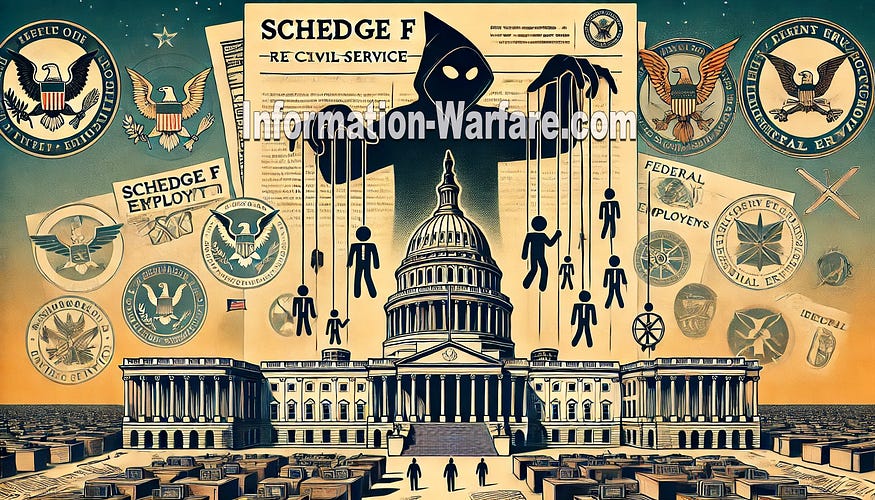Schedule F & Project 2025
Understanding Schedule F and Project 2025 and Autocracy

Schedule F: This is a job classification system introduced briefly at the end of the Trump administration. It reclassified a significant number of federal positions, making them easier to hire and fire based on loyalty rather than merit. The aim was to enable the president to exert greater control over the federal bureaucracy by removing civil service protections from policy-related positions.
Project 2025: Organized by the Heritage Foundation, Project 2025 is an initiative preparing policy and personnel plans for the next conservative administration. A key component of this project is the revival of Schedule F. The goal is to reclassify federal employees to make them more responsive to presidential directives, thereby “bending or breaking the bureaucracy to the presidential will”.
Potential Implications
Erosion of Civil Service Protections:
Accountability: Critics argue that this could degrade the quality and impartiality of the federal workforce. Studies have shown that politicization negatively affects government performance and increases corruption.
Meritocracy: Removing civil service protections undermines the merit-based system, potentially leading to less effective governance and a workforce that serves political interests over public good.
Increased Presidential Power:
Centralized Control: By reclassifying federal positions under Schedule F, the president could more easily enforce loyalty and direct federal actions without checks and balances.
Risk of Abuse: This could pave the way for authoritarian tendencies, allowing a president to manipulate federal resources and personnel for political gain.
Impact on Public Trust:
Distrust in Government: The politicization of federal positions may erode public trust in the government’s ability to act impartially and in the public interest.
Long-term Consequences: Such changes could have lasting impacts on the structure and function of the U.S. government, making it more susceptible to political whims and less stable.
The implementation of Schedule F under Project 2025 represents a significant shift in how the federal government could operate, prioritizing loyalty over expertise and potentially undermining the principles of a merit-based civil service. This move has sparked considerable debate about its implications for democracy and governance in the United States.
How Schedule F and Project 2025 Could Lead to an Autocracy
Schedule F and Project 2025 have the potential to shift the balance of power within the U.S. government in a way that could pave the path toward autocracy. Here’s how:
1. Concentration of Power
Schedule F:
Reclassification of Federal Employees: By reclassifying a large number of federal positions to make them easier to hire and fire based on loyalty rather than merit, Schedule F undermines the independence of the civil service (Protect Democracy) (Media Matters).
Control Over Bureaucracy: This reclassification gives the president greater control over the federal workforce, enabling them to replace non-partisan experts with political loyalists. This could make the bureaucracy more responsive to the president’s directives, regardless of legality or ethical considerations (Protect Democracy) (Media Matters).
Project 2025:
Policy Implementation: This project outlines a comprehensive plan to ensure that the next conservative administration can effectively implement its agenda by placing loyalists in key positions and reasserting control over federal agencies (Media Matters).
Strategic Appointments: By strategically appointing individuals who align with specific ideological goals, Project 2025 aims to reshape federal agencies to reflect its vision, reducing the checks and balances that typically constrain executive power (Media Matters).
2. Erosion of Checks and Balances
Weakened Oversight: With the ability to remove and replace federal employees at will, the president can bypass traditional oversight mechanisms. This makes it easier to push through controversial policies without opposition from within the government (Media Matters).
Judiciary and Legislative Influence: The increased power over federal appointments extends to the judiciary and key legislative positions, allowing the executive branch to influence rulings and legislation more directly (Media Matters).
3. Politicization of the Civil Service
Loss of Neutrality: The civil service is designed to be a non-partisan body that implements laws and policies based on expertise and fairness. Schedule F threatens this neutrality by making it easier to hire and fire employees based on political loyalty (Protect Democracy).
Policy Enforcement: Federal employees may feel pressured to enforce policies that align with the president’s agenda, even if they conflict with established laws or ethical standards, to avoid dismissal (Media Matters).
4. Impact on Democratic Norms
Democratic Backsliding: As the executive branch gains more direct control over the federal workforce and weakens institutional checks, the risk of democratic backsliding increases. This can lead to an erosion of democratic norms and principles, paving the way for more authoritarian governance (Protect Democracy) (Media Matters).
Public Trust: The politicization of federal agencies and the erosion of institutional independence can undermine public trust in government institutions, leading to increased cynicism and reduced civic engagement (Media Matters).

Conclusion
Schedule F and Project 2025 could significantly alter the structure and function of the U.S. government, concentrating power in the executive branch and undermining the independence of federal agencies. This shift could erode democratic norms and lead to a more autocratic form of governance. Recognizing these potential risks is crucial for maintaining a balanced and democratic government structure.

